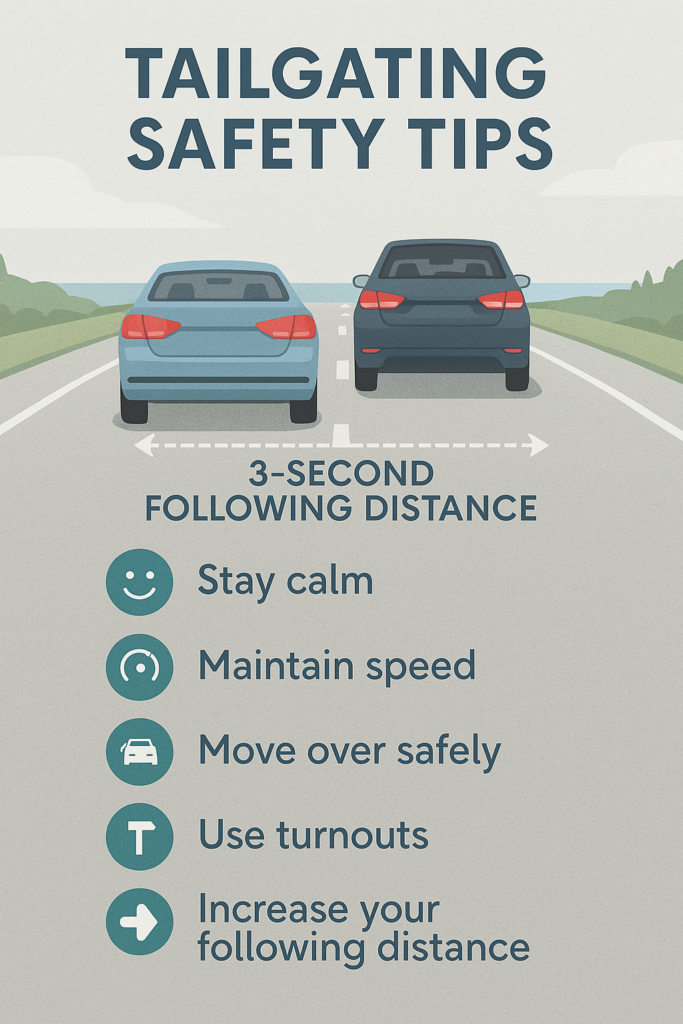Why Tailgating Is Dangerous — And How to Handle It Safely on Nova Scotia Roads
Tailgating is one of the most common bad habits on Nova Scotia roads — and one of the most dangerous. Whether you’re stuck in Halifax traffic or cruising on Highway 102, a vehicle too close behind you can turn a minor stop into a serious collision.
Understanding tailgating safety in Nova Scotia isn’t just about keeping yourself safe — it’s also about learning how to respond calmly and prevent the situation from escalating.
What Is Tailgating?
Tailgating happens when one vehicle follows another too closely, leaving little or no space to stop if something unexpected happens. It’s not just annoying — it’s a safety risk that reduces your time to react and increases the chance of rear-end crashes.
In Nova Scotia, where weather conditions often reduce visibility and traction, following too closely is even more dangerous. Snow, rain, and fog can turn minor mistakes into emergencies.
Why Do People Tailgate?
Drivers tailgate for a few common reasons:
- They’re in a rush and think tailgating will “push” the car ahead to go faster
- They’re impatient in heavy traffic
- They’re distracted and not maintaining proper distance
- They’re trying to intimidate or express road rage
None of these reasons justify the behavior. Regardless of intent, tailgating is aggressive and dangerous — especially in areas like downtown Halifax or near construction zones where sudden stops are frequent.
The 3-Second Rule: Your First Line of Defense
If you’re the one driving behind someone, use the 3-second rule. Pick a stationary object on the side of the road (like a pole or sign). When the car in front of you passes it, start counting: “one-thousand-one, one-thousand-two, one-thousand-three.”
If you pass the same object before finishing the count, you’re too close. In poor weather, double the gap to 6 seconds. This simple rule is one of the best defensive driving techniques available.
What to Do If You’re Being Tailgated
So what should you do if someone is tailgating you?
- Stay calm. Don’t slam the brakes or try to “teach them a lesson.” That only increases risk.
- Maintain your speed. Don’t speed up. Stick to a safe, legal pace — especially in speed zones.
- Move over safely. If you’re on a multi-lane road, signal and change lanes to let them pass.
- Use turnouts or shoulders. On rural roads, wait for a safe spot and pull slightly to the side if needed.
- Increase your own following distance. This gives you more room to brake gradually, avoiding chain collisions.
These strategies are taught in depth in defensive driving courses across Nova Scotia — because staying composed is key to safety.
Tailgating and Nova Scotia Law
Tailgating can result in fines, demerit points, or even criminal charges if it causes an accident. Section 100 of the Nova Scotia Motor Vehicle Act states that drivers must maintain a safe distance, especially when following on highways or through cities like Truro or Bedford.
If you’re involved in a crash caused by a tailgater, they’re almost always at fault legally — but you can still be injured or have your vehicle damaged. Prevention is always better than dealing with the aftermath.
Driving Safely in Every Season
In winter, tailgating becomes even riskier. Icy roads reduce stopping ability, and rear-end collisions are far more likely. In spring and fall, wet leaves and rainfall reduce traction. Even in summer, busy roads and distracted driving can lead to trouble.
Learning to deal with tailgaters is part of being a responsible driver in Nova Scotia — and part of adopting everyday defensive driving techniques that make you safer.






